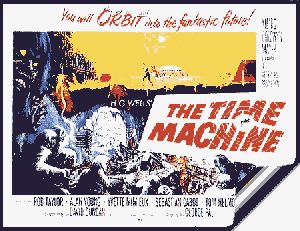 
|
Part 2
|
| The Nutty Professor (1963) |
| This film is one of those guilty pleasures we all have. A cinematic chocolate chip cookie. It's a reworking of Dr Jekyll and Mr Hyde with Lewis' patented nerd as the former and a brilliant comedic creation "Buddy Love" as the latter. Lewis is a university professor, Julius Kelp who discovers the potion and, in a local nightspot called The Purple Pit becomes crooning swinger, Buddy Love. Sexist, insensitive, chain-smoking, dressing in a Norman Gunston suit, singing That Old Black Magic with exaggerated mouth movements, Love is a brilliant creation with aspects gathered from a number of sources, one of whom has the name Sinatra. The film's full of good sight-gags and the best hangover sequence ever filmed. Nothing deep here, but every now and then I drag it out and watch it again. |
| X - the Man with X-Ray Eyes (1963) |
| Ray Milland is Dr Xavier, a driven scientist who discovers a liquid that gives him x-ray vision. Low budget, this Roger Corman flick is genuinely scary and imaginative. It's solidly in the genre of "there are things man was not meant to know (or rather, perceive)". Milland's pouchy, line-rimmed eyes and furrowed brow, the increasingly thicker dark glasses, the insomnia caused by his ability to see through his own eyelids, his degeneration from scientist to sideshow act to diagnostic skid-row miracle worker, the logical extrapolation on a premise all build up to a climax more powerfully than any Corman flick I can recall. This one turns up occasionally on TV, so tape it. | |

|
| It! (1966) | |
| I caught this one on TV the other week. Roddy McDowell plays a museum curator who finds that weird statue is actually the original golem. Being inspired by Norman Bates, McDowell keeps his mummified mum around the house in a rocking chair. He lusts repressedly for Jill Haworth and it bitchy behind the backs of his employers. By the time he learns how to control the unlimited power of It!, it's difficult to work out someone worse to give it to (Ollie North, perhaps).
The scene where the golem bench-presses London Bridge until it breaks while McDowell hangs around to watch the show is audaciously silly. In the final scene, the authorities, having been unable to get past the golem, tactically-nuke Roddy and his museum. The indestructible golem walks into the sea and the credits roll. A very bad movie, but not without features of interest. |
| Privilege (1966) |
| William Gibson, in his first published story, The Gernsback Continuum eviscerated the smooth Bauhaus futures imagined in the 1930s. The flying wing aircraft with ballrooms on board, cinemas that wouldn't have looked out of place on the planet Mongo.
Hindsight has made those imaginings malevolent and dangerously wrong-headed. But I've always preferred the 1960s idea of the future. Barbarella's shag-pile spaceship; the video walls, monorails and Swedish furniture in Fahrenheit 451; the groovy costumes on Ursula Andress in The Tenth Victim; the gear John Phillip Law wore in Danger: Diabolik and the high-collared semi-military suits and later, pastel neo-Edwardian finery worn by the young and beautiful in Peter Watkin's Privilege. Privilege is one of the most intelligent, dystopic and interesting SF films of the '60s. It's framed as a documentary on Steve Shorter, 'the most abjectly beloved pop star in the world'. His stage act shows Shorter incarcerated, mocked and beaten by police as he signs angst-ridden songs. The audience of (mostly) young girls empathise so stronger with Shorter's pain that there's a riot after the show. Just as the authorities want. They're using Shorter as a pressure valve, controlling the rebellion of the young and turning his popularity into merchandising possibilities. 230 Steve shorter discos all over England, Steve Shorter shopping malls to encourage people to 'buy British', he's a corporate icon and from the moment we see him in a ticker-tape parade, we realise that he's stressed out to the max. and on the verge of a full nervous collapse. The culmination of the movie's crypto-fascist scenario is a Nuremburg style rally as Shorter Enterprises goes into partnership with the Combined Churches of England. The film has a number of telling moments. Shorter channel-switching his wrist-radio: each station playing the same Steve Shorter song. Nazi salutes with Union Jack armbands. The sanctimonious interview with Shorter-s manger where he emphatically states that they do not sell Steve's hair when he has it cut -- they donate it to charity. |
| The Forbin Project (1969) |
| This is the definitive computer-takes-over-the-world movie. The computer technology is a little dated -- you get the impression that anyone with a 486 and 14.4 modem could hack Colossus and dump a virus into his system -- but dramatically, the movie works well. The USA and USSR both turn their missile defenses over to self-aware computer systems who bond together and take over the world. In a way, the computer becomes the ultimate parent; a total control freak with the power to back up the nagging. Eric Braden (as Forbin) and Susan Clark are the strong leads and there's lots of that 1960s flashing light computer technology with the tape reels and checkerboard disco-floor computer cabinets. This film fulfills every dark fantasy of the technophobe.
|
Next month: The early seventies: Crosstime to Planet Porno
|
Like us on facebook |
No other uses are permitted without the prior written consent of owner. Use of the material in violation of the foregoing may result in civil and/or criminal penalties. Celebrate everything! www.festivale.info ISSN 1328-8008 Published in Melbourne, Victoria, Australia disclaimers | contact the editor | Festivale revision history  Published in Melbourne, Victoria, Australia Published in Melbourne, Victoria, Australia  copyright © Festivale 1999 All rights reserved copyright © Festivale 1999 All rights reservedFiled: 1-May-1997 |

